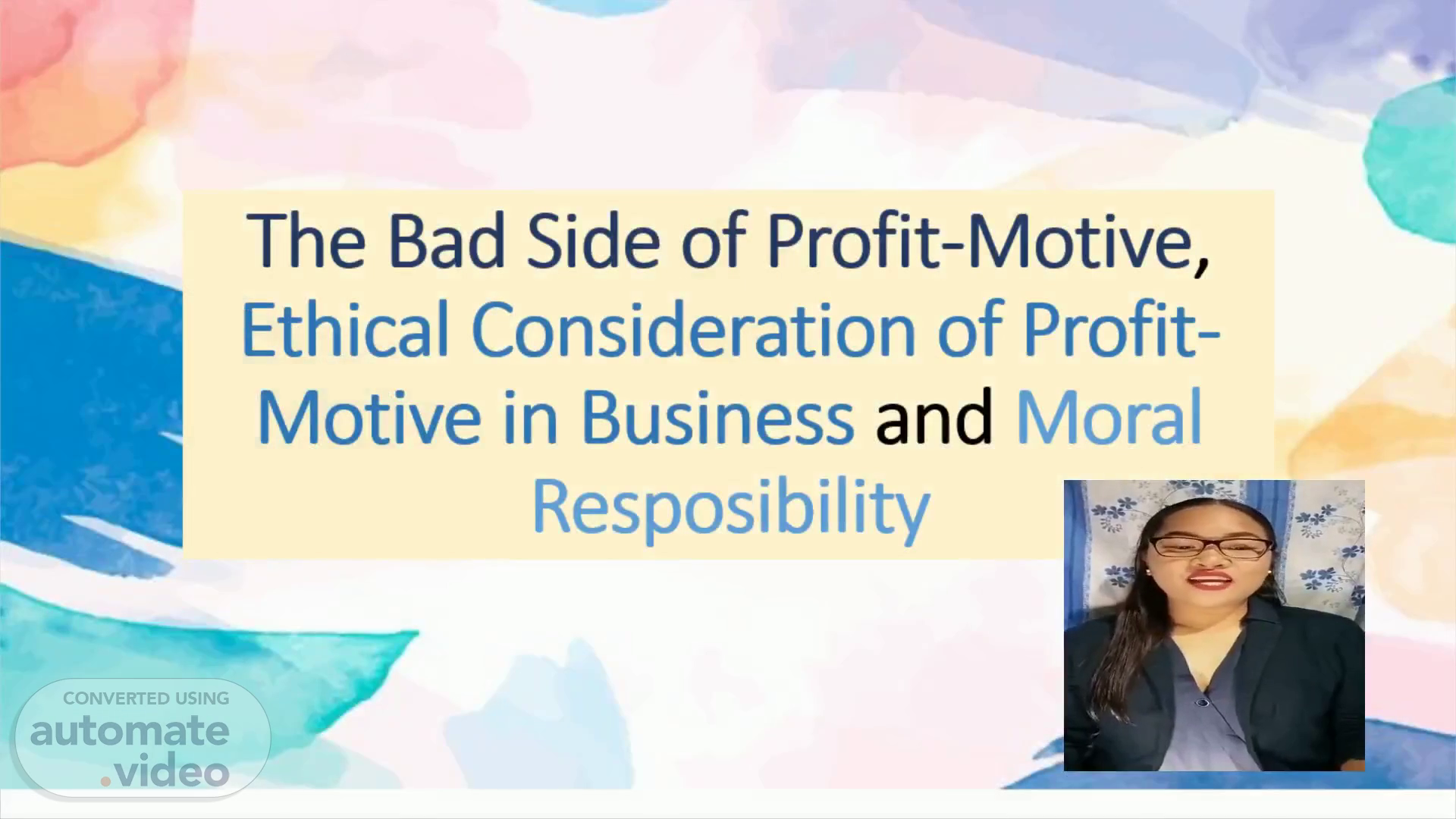Page 1 (0s)
The Bad Side of Profit-Motive , Ethical Consideration of Profit- Motive in Business and Moral Resposibility.
Page 2 (16s)
The Bad Side of Profit-Motive. 1.Profit-motive promotes rivalry among competitor . Sometimes the competition becomes so stiff that it results into a 'dog-eat-dog world of business where success is achieved by competing with others and pushing them down in order that one's own business might succeed. 2. Profit-motive makes people focus only on making money , that is, to sell as many goods as possible without considering whether or not these products satisfy the needs and wants of consumers and end- users. 3. Profit-motive turns the businessman from being a reflective and a questioning person because he focuses his attention only on the practical activity of making money. 4. Profit-motive promotes self-interest rather than the common good . It has, to some extent, benefited some businessmen but it has also created some social costs that many people, if not the majority, have to bear, e.g., depletion of the natural resources, toxic wastes being thrown into the rivers pollution of the environment and disregard for the next generations to come..
Page 3 (4m 49s)
Ethical Considerations of Profit-Motive in Business.
Page 4 (5m 50s)
Ethical Considerations of Profit-Motive in Business.
Page 5 (7m 35s)
Ethical Considerations of Profit-Motive in Business.
Page 6 (8m 36s)
Moral Responsibility. The author William H. Shaw, in his book Business Ethics (1999, pp.163-165), came up with three meanings of moral responsibility 1.Moral Responsibility refers to holding to people morally accountable for some past action or actions. This simply means assigning to people blame or praise for particular actions that they have performed. 2. Moral Responsibility also means care, welfare or treatment of others as derived from the specific social role that one plays in the society . Thus, parents are responsible for taking care of their children in the family, teachers are responsible for what occurs in their classrooms and doctors are responsible for the treatments of their hospital patients. In this second sense, moral responsibility implies a duty to be performed by a person depending on his role in the society. 3. Moral Responsibility likewise refers to one's capacity for making moral or rational decisions on his own. According to Shaw, if a person is not morally responsible in this third sense, he or she cannot be considered morally responsible in either of the other senses..
Page 7 (10m 7s)
Moral Responsibility. The author William H. Shaw, in his book Business Ethics (1999, pp.163-165), came up with three meanings of moral responsibility 1.Moral Responsibility refers to holding to people morally accountable for some past action or actions. This simply means assigning to people blame or praise for particular actions that they have performed. 2. Moral Responsibility also means care, welfare or treatment of others as derived from the specific social role that one plays in the society . Thus, parents are responsible for taking care of their children in the family, teachers are responsible for what occurs in their classrooms and doctors are responsible for the treatments of their hospital patients. In this second sense, moral responsibility implies a duty to be performed by a person depending on his role in the society. 3. Moral Responsibility likewise refers to one's capacity for making moral or rational decisions on his own. According to Shaw, if a person is not morally responsible in this third sense, he or she cannot be considered morally responsible in either of the other senses..
Page 8 (12m 0s)
Moral Responsibility. The author William H. Shaw, in his book Business Ethics (1999, pp.163-165), came up with three meanings of moral responsibility 1.Moral Responsibility refers to holding to people morally accountable for some past action or actions. This simply means assigning to people blame or praise for particular actions that they have performed. 2. Moral Responsibility also means care, welfare or treatment of others as derived from the specific social role that one plays in the society . Thus, parents are responsible for taking care of their children in the family, teachers are responsible for what occurs in their classrooms and doctors are responsible for the treatments of their hospital patients. In this second sense, moral responsibility implies a duty to be performed by a person depending on his role in the society. 3. Moral Responsibility likewise refers to one's capacity for making moral or rational decisions on his own. According to Shaw, if a person is not morally responsible in this third sense, he or she cannot be considered morally responsible in either of the other senses..
Page 9 (13m 50s)
Business Ethics. Business Ethics Defined: 1. Business Ethics is the study of what is the right and wrong human behavior and conduct in business. 2. Business Ethics is a study of the perceptions of people about morality, moral norms, moral rules and ethical principles as they apply to people and institutions in business. 3. Business Ethics is the study, evaluation, analysis and questioning of ethical standards, policies, moral norms and ethical theories that managers and decision makers use in resolving moral issues and ethical dilemmas affecting business..
Page 10 (15m 52s)
THANK YOU FOR LISTENING!. HAVE A GREAT DAY AHEAD!.
